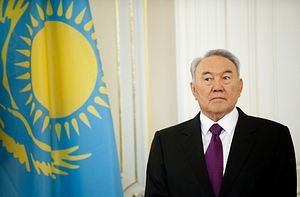Last year, when Russian President Vladimir Putin aired a narrative that the Kazakhs had never had a state before Nazarbayev, it set off a strident campaign by Astana to attest to the longevity of the Kazakh state. This effort has focused largely on highlighting 2015 as the 550th anniversary of the Kazakh khanate, but has also found expression in other areas — such as the jailing of Kazakh citizens on separatism charges and targeting of independent media outlets.
First a refresher on Putin’s comments. A young woman at the Selgier National Youth Forum — a sort of pro-Kremlin summer camp — asked the president during a Q & A session about the growth of Kazakh nationalism. She launched her question by referencing Ukraine and then noting the “growth of nationalist attitudes in Kazakhstan, particularly in southern Kazakhstan.” (Note: quotes are from Noah Schenkkan’s translation, from a video of the session. The Kremlin also has an English transcript, but it omits some parts.) Her question, specifically, poses the idea of a Ukraine scenario in a post-Nazarbayev Kazakhstan.
In response, Putin lavishes Nazarbayev and Kazakhstan with praise, but then makes a shockingly backhanded remark :
I already said that he accomplished a unique thing. He created a state on a territory where there had never been a state. The Kazakhs had never had statehood. He founded it. In that sense on the post-Soviet space he is a unique individual, and for Kazakhstan also.
Schenkkan called it the “most important political development in Kazakh-Russian relations in the last five years.” Casey Michel, here at The Diplomat, wrote, “Following his compliments toward Nazarbayev, a certain dog-whistle chauvinism ran through the rest of Putin’s response.”
Astana’s response was to proclaim 2015 the 550th anniversary of the Kazakh khanate and stuff the year with events and planned soap operas — regardless of the strict historical accuracy of the claim.
Another dimension of Astana’s response was evident today when a court in Ridder, a town in the East Kazakhstan region, sentenced 26-year-old Igor Sychyov to five years in jail. His crime? Posting a poll on a group (“It Was Heard In Ridder”) on the Russian version of Facebook, VKontakte, that asked whether eastern Kazakhstan should join Russia. He had been found guilty of inciting separatism.
According to RFE/RL, when Sychyov was charged in October he denied the charge, “saying that he did not create the poll but put it on his group’s site by negligence.” RFE/RL says that at least three other Kazakh nationals have been sentenced on separatism charges this year.
Social media isn’t the only targeted medium; independent media outlets have also come under pressure. ADAM bol, a weekly magazine, was ordered to close earlier in the year — stemming from a lawsuit related to an interview with opposition activist Aidos Sadyqov in which he is critical of Russian involvement in Ukraine. A successor publication, ADAM, was fined and suspended for three months in August after authorities in Almaty said it violated Kazakhstan’s languages law by issuing copies only in Russian. In October, courts ordered the magazine to close.
Opposition, separatism, nationalism, and language are interwoven and touchy subjects in Kazakhstan. In statements, Nazarbayev often touts multiethnic Kazakhstan’s unity as one of its greatest strengths. Questioning that narrative is not appreciated.
































